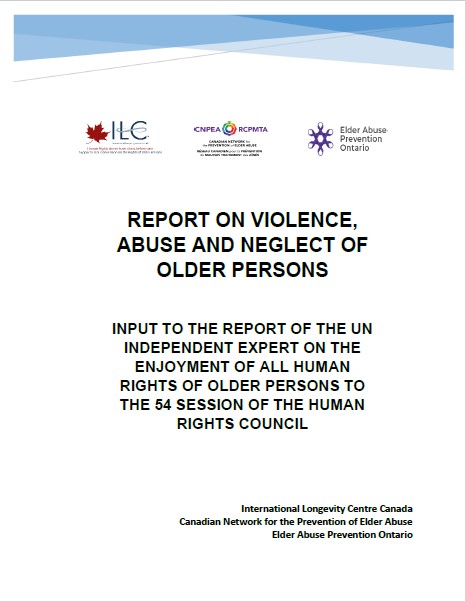Blog
- Details
Joint statement of the Global Alliance for the Rights of Older People (GAROP)
for the 13th session of the Open-Ended Working Group on Ageing
(OEWGA), 3-6 April 2023
This statement is made on behalf of the 400 member organizations of the Global Alliance for the Rights of Older People.
- Details

The International Longevity Centre Canada, along with its partners, is proud to announce that the Canadian Coalition Against Ageism (CCAA) is moving forward with its vision for a Canada free of ageism against older persons.
The CCAA is a nation-wide social change movement to combat ageism against older people while protecting and strengthening their human rights.
Ahead of the 13th U.N. Open-Ended Working Group on Aging, ILC Canada has shared the vision, goals and principles of this new coalition. More details coming soon.
- Details
The Independent Expert on the Enjoyment of All Human Rights By Older Persons, Dr. Claudia Mahler, is preparing a report on violence, abuse and neglect of older persons for the 54th Session of the Human Rights Council. International stakeholders were invited to submit contributions before March 1, 2023.
"In this report, the Independent Expert will aim at examining the existing international and regional legal protection standards applicable to the issue of violence against older persons, as well as, at analysing the manifestations and forms of violence, abuse and neglect faced by older persons. It will also identify and analyse good practices in combating violence and abuse of older persons to be able to fully enjoy their human rights. Furthermore, the Independent Expert will analyse the issue from an intersectional perspective, in exploring the interactions with other social factors such as gender, sex, race, ethnicity, indigenous identity, disability, sexual orientation, gender identity, religion, social status, place of origin and immigration status. Finally, the Independent Expert will provide recommendations on ways to protect older persons from violence while upholding their human rights, and in ensuring victims, access to justice, remedies and reparations." (Office of the High Commissioner on Human Rights)
The International Longevity Centre Canada, the Canadian Network for the Prevention of Elder Abuse and Elder Abuse Prevention Ontario delivered a joint submission, which can be accessed and downloaded here.
- Details


Dalhousie University researchers and partners are working on the Interprovincial Violence Against Women Project in Nova Scotia, New Brunswick, and Ontario. The IPV Project aims to identify and share knowledge around best practices for preventing and responding to violence against women (VAW) during and beyond the COVID-19 pandemic.
- VAW Staff (Leadership & Direct Support) are invited to participate in an online survey about your experiences working to support women experiencing violence during the COVID-19 pandemic. The survey will take about 30 minutes and you will be compensated $10 for your time (e-transfer or e-gift card). VAW Staff Survey, participate here: redcap.link/vawstaff
Download the poster for VAW staff - VAW Survivors/Clients are invited to participate in an online survey about your experiences accessing or wanting to access VAW services during the COVID-19 pandemic. The survey will take about 30 minutes and you will be compensated $15 for your time (e-transfer or e-gift card). VAW Survivor Survey, participate here: https://redcap.link/vawsurvivor
Download the poster for VAW survivors
For more information, please see: www.vawresearch.com or contact .
Project lead: Dr. Alexa Yakubovich, Department of Community Health & Epidemiology, Dalhousie University


- Details
Few know what elder abuse looks like and fewer talk about it. So, it stays behind closed doors.
A partnership team comprising researchers from the department of Community Health Sciences at the University of Manitoba and community partners and advisors A&O Support Services for Older Adults (Manitoba), the Saskatoon Council on Aging, and the Kerby Centre, have developed the video Who Should I Tell?. It aims to increase awareness of the abuse of older adults and to foster dialogue. The goal is to encourage disclosure and discussion among older adults, family and friends.
The original video was released for World Elder Abuse Awareness Day 2021. It has successfully been helping residents of the prairies start to talk about elder abuse, regardless of language. It is now also available in French, German, Punjabi, Tagalog and Plains Cree. Click the language to view the video:
Please share this video to help your community partners, agencies, older adults, and family members. You can share your feedback with Dr. Kerstin Roger, Professor, Community Health Sciences, University of Manitoba, .
If you notice abusive situations among your friends, family, neighbors and community, it is important to talk about it. If you are experiencing abuse, talking to someone you trust is the first step in reducing the harm and staying safe. If you are unsure how to start the conversation, or if you need more information to learn about the signs of elder abuse, reach out to your local senior centre as a first step, or visit cnpea.ca. You can find helplines and support services in your Province or Territory on the CNPEA's Find Help page.
Who Can You Tell? Video:
Principal Investigator: Dr. Kerstin Roger, Professor, Community Health Sciences, University of Manitoba, .
Co-Investigators: Dr. Donna Goodridge (Sask), Dr. Christine A. Walsh (AB), Stacey Miller (A&O Support Services for Older Adults, Inc, Manitoba)
Community Advisory Committee Representatives (SCOA, Kerby Centre, A&O Support Services Inc)
Page 9 of 55


















